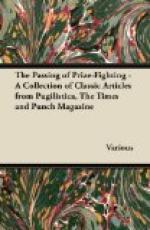* * * * *
The Rev. Frank Farmer, hero of Mr. RICHARD MARSH’S The Deacon’s Daughter (LONG), was the youthful, good-looking and eloquent Congregationalist minister of the very local town of Brasted, and the ladies of his flock adored him. So earnestly indeed did they adore him that, after he had preached a stirring series of sermons on the evils of gambling, they decided to subscribe and send him for a holiday to Monte Carlo. On his return he was to preach another course of sermons, which “would rouse the national conscience and, with God’s blessing, the conscience of all Europe.” Possibly you can guess what happened to him; I did, and I am not a good guesser. The Rev. Frank had never been out of England, and he found Monte Carlo inhabited by ladies who made him blush. He could not understand their bold ways, so different from the manner of the Brasted maidens. One of them laid especial siege to him and assured him that he had “la veine.” At first I am inclined to believe that he thought she was talking of something varicose, but when he understood what she meant he was at her mercy. In short he tried his luck, to the dismay of his conscience but with prodigious benefit to his pocket. His return to Brasted is described with excellent irony.
* * * * *
Mr. WILL IRWIN’S war-book naturally divides itself into two parts, since he was lucky enough to get near the Front both about Verdun during the great attack, and with the Alpini fighting on “the roof of Armageddon.” To these brave and picturesque friends of ours he dedicates his study, The Latin at War (CONSTABLE). You must not expect much of that inside information which the author, as an American journalist, must have been sorely tempted to produce. Indeed he has little to offer us that has not been common property of the Correspondents for long enough, and several of his descriptions (his picture of a glacier, for one), given with a rather irritatingly childlike air of new discovery, cannot escape the charge of commonplace. But his reflections, for once in a way the better half of experience, more than make good this defect. His essay on Paris, for instance—“the city of unshed tears”—is something more than interesting, and his analysis of the cause of the successes of the French army, in the face of initial defects of material, even better. The author of Westward Ho!, considering the Spanish and English navies of ELIZABETH’S time, found precisely the same contrasted elements of autocracy and brotherliness producing just those results that we find respectively in the German and French forces of to-day—on the one hand a mechanical perfection of command, on the other an informed equality which, somehow, does not make against efficiency whilst fostering individuality. Mr. IRWIN hardly refers to our own Army; but one is thankful to remember that discipline by consent, one of the virtues of true democracy, is not the exclusive tradition of our French allies.




